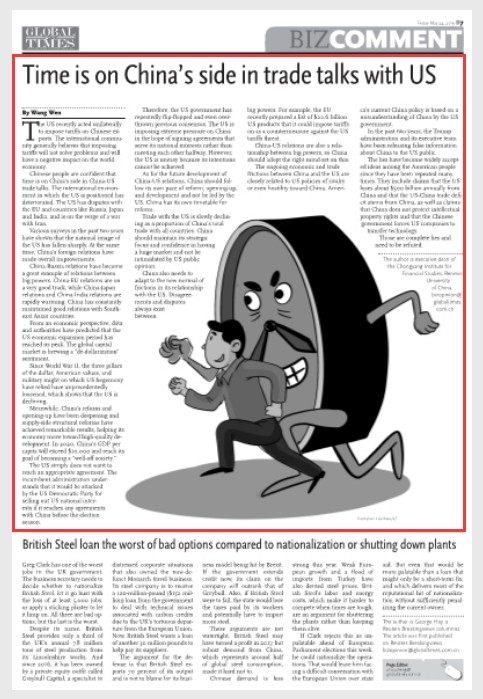Commentaries
Your Present Location: Teacher_Home> Wang Wen> CommentariesTime is on China’s side in trade talks with US
By Wang Wen Source: Global Times Published: 2019-5-23
The US recently acted unilaterally to impose tariffs on Chinese exports. The international community generally believes that imposing tariffs will not solve problems and will have a negative impact on the world economy.

Chinese people are confident that time is on China's side in China-US trade talks. The international environment in which the US is positioned has deteriorated. The US has disputes with the EU and countries like Russia, Japan and India, and is on the verge of a war with Iran.
Various surveys in the past two years have shown that the national image of the US has fallen sharply. At the same time, China's foreign relations have made overall improvements.
China-Russia relations have become a great example of relations between big powers. China-EU relations are on a very good track, while China-Japan relations and China-India relations are rapidly warming. China has constantly maintained good relations with Southeast Asian countries.
From an economic perspective, data and authorities have predicted that the US economic expansion period has reached its peak. The global capital market is brewing a "de-dollarization" sentiment.
Since World War II, the three pillars of the dollar, American values, and military might on which US hegemony have relied have unprecedentedly loosened, which shows that the US is declining.
Meanwhile, China's reform and opening-up have been deepening and supply-side structural reforms have achieved remarkable results, helping its economy move toward high-quality development. In 2020, China's GDP per capita will exceed $10,000 and reach its goal of becoming a "well-off society."
The US simply does not want to reach an appropriate agreement. The incumbent administration understands that it would be attacked by the US Democratic Party for selling out US national interests if it reaches any agreements with China before the election season.
Therefore, the US government has repeatedly flip-flopped and even overthrown previous consensus. The US is imposing extreme pressure on China in the hope of signing agreements that serve its national interests rather than meeting each other halfway. However, the US is uneasy because its intentions cannot be achieved.
As for the future development of China-US relations, China should follow its own pace of reform, opening-up, and development and not be led by the US. China has its own timetable for reform.
Trade with the US is slowly declining as a proportion of China's total trade with all countries. China should maintain its strategic focus and confidence in having a huge market and not be intimidated by US public opinion.
China also needs to adapt to the new normal of frictions in its relationship with the US. Disagreements and disputes always exist between big powers. For example, the EU recently prepared a list of $22.6 billion US products that it could impose tariffs on as a countermeasure against the US tariffs threat.
China-US relations are also a relationship between big powers, so China should adopt the right mind-set on this.
The ongoing economic and trade frictions between China and the US are closely related to US policies of rivalry or even hostility toward China. America's current China policy is based on a misunderstanding of China by the US government.
In the past two years, the Trump administration and its executive team have been releasing false information about China to the US public.
The lies have become widely accepted ideas among the American people since they have been repeated many times. They include claims that the US loses about $500 billion annually from China and that the US-China trade deficit stems from China, as well as claims that China does not protect intellectual property rights and that the Chinese government forces US companies to transfer technology.
Those are complete lies and need to be refuted.
The author is executive dean of the Chongyang Institute for Financial Studies, Renmin University of China.























































































 京公网安备 11010802037854号
京公网安备 11010802037854号





